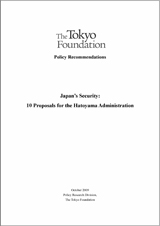- Policy Proposal
- Comparative and Area Studies
Japan’s Security: 10 Proposals for the Hatoyama Administration
November 20, 2009
The new Yukio Hatoyama administration has run into a snag over the Futenma relocation issue with Washington. Given the importance of the security relationship with the United States, the Tokyo Foundation has compiled an emergency report offering 10 recommendations on the government’s national security policy.

PDF for download
(118 KB, 12 pages)
The Democratic Party of Japan (DPJ) has brought about a historic change of government following its election victory in August 2009. As a campaign pledge, DPJ leader Yukio Hatoyama has been advocating a review of the ongoing realignment of US forces in Japan and the role of US bases in Japan.
The U.S. Government has been increasingly frustrated by Hatoyama’s insistence on the relocation of Futenma Air Station outside Okinawa, rather than to a new offshore facility at Camp Schwab, as stipulated in the 2006 agreement between the two governments.
Hatoyama, moreover, has dismissed the preceding government’s efforts to develop new National Defense Program Guidelines, which were scheduled to be completed by December 2009.
For these and other reasons, criticism and concerns have been raised over the lack of a coherent strategy in the administration’s defense and security policies.
Given the urgency of this situation, the Tokyo Foundation’s Security Studies Project team has produced a set of 10 policy recommendations addressing pressing issues on Japan’s national security that are vital for the Japan-US alliance.
The original Japanese version of these recommendations was issued on October 22, 2009. The Futenma relocation issue has remained unresolved since then despite Washington’s prodding.
While Futenma is only one of the challenges faced by the Hatoyama Administration in its foreign and security policies, it is of symbolic importance, and honoring the agreement is vital for the Japan-US alliance.
We strongly hope that Prime Minister Hatoyama realizes the urgency of this issue and will honor the agreement before it is too late.
Other recommendations are equally important, if not quite as urgent, for the administration to build a close and equal relationship with the United States. It is our conviction that these recommendations are crucial for Japan’s national interests as well.
10 Policy Proposals (Abstract)
Download full text in PDF format (118 KB, 12 pages)
The Japan-US Alliance
Proposal 1: The administration should not insist on the relocation of an air station outside Okinawa but should deal flexibly with the agreement regarding the realignment of US forces in Japan. Otherwise, the US bases in Okinawa might end up becoming fixed in their present locations.
Proposal 2: The administration should avoid rushing to alter the Japan-US Status of Forces Agreement, which should be raised as a long-term bilateral issue. The immediate aim should be to improve implementation of the agreement so as to reduce the burden on local residents.
Challenges to Global Peace
Proposal 3: As part of its efforts to achieve global peace and prosperity, the administration should expand Japan’s involvement in antipiracy activities off the coast of Somalia to include refueling missions for other nations’ naval vessels. At the same time, the administration should increase Japan’s participation in United Nations peacekeeping operations with a long-term vision.
Proposal 4: In the short term, Japan should support reconstruction efforts in Afghanistan by continuing its refueling operations in the Indian Ocean in some form or by pursuing suitable alternative cooperation. In the longer term, Japan should aim to contribute by training personnel for reconstruction work in Afghanistan and by building and running international training and support facilities for such personnel either in neighboring countries or Japan.
Proposal 5: Japan should actively make and implement proposals to realize the ideal of a “world without nuclear weapons.” Nuclear disarmament is important, but it must not impair the reliability of the US nuclear umbrella.
Proposal 6: To prevent further nuclear proliferation and compel North Korea to abandon its nuclear programs, Japan should strengthen both its diplomatic efforts through the Nuclear Non-Proliferation Treaty regime and the military pressure it applies on North Korea principally through the Japan-US alliance.
Proposal 7: Japan should dramatically strengthen its UN diplomacy and continue its efforts to become a permanent member of the UN Security Council, while boldly taking the lead in “human security,” a field Japan itself proposed. First, the prime minister should attend without fail the General Debate of the UN General Assembly held every September, and the administration should also strive to exercise leadership in UN activities by dispatching more Japanese to serve in key UN posts, such as UN representatives for peacekeeping operations.
Relations with the Asia-Pacific Region
Proposal 8: To establish “intra-regional cooperative mechanisms in the Asia-Pacific region,” as the new Hatoyama administration aims, it is essential to strengthen Japan’s cooperation not only with its ally the United States but also with South Korea, Australia, ASEAN, and other partners while pursuing a strategic relationship with China. The administration should pursue regional stability by building multilayered cooperative relationships.
Guidelines and Policy Infrastructure to Defend a Peaceful Japan
Proposal 9: There is an urgent need to develop new National Defense Program Guidelines, setting out clear guiding principles for defense policy and, based on these, systematically establishing defensive capabilities. This is important because it will also serve to demonstrate clearly to those both in Japan and overseas the new administration’s national security and defense strategy.
Proposal 10: To address global security issues effectively, the administration should both strengthen Japan’s own intelligence capabilities and the system for Japan-US intelligence sharing. This is necessary to enable Japan to make independent judgments and to realize a more equal relationship with the United States.
Full text is now available in PDF format for download (118 KB, 12 pages)
